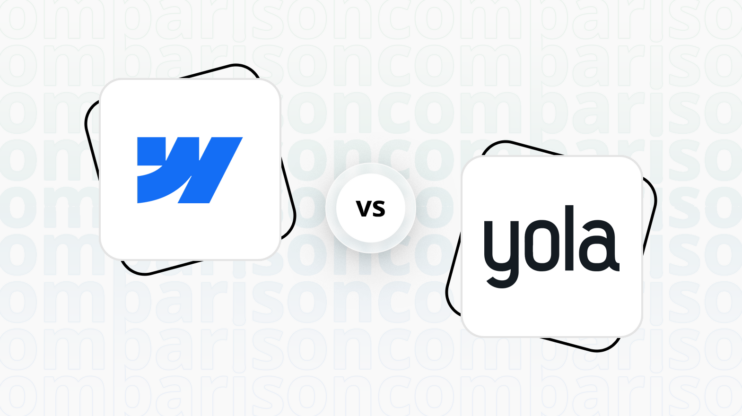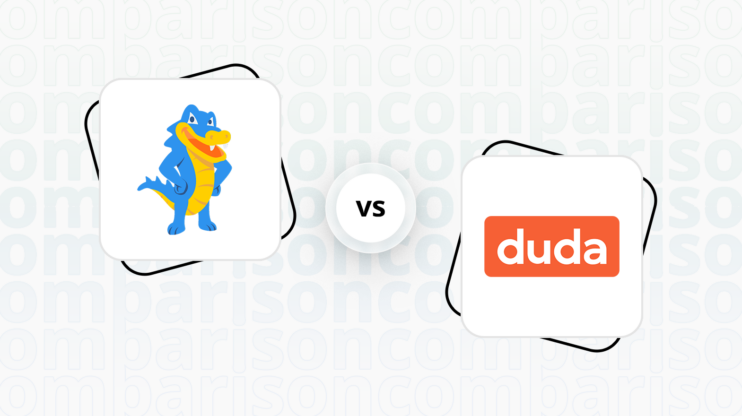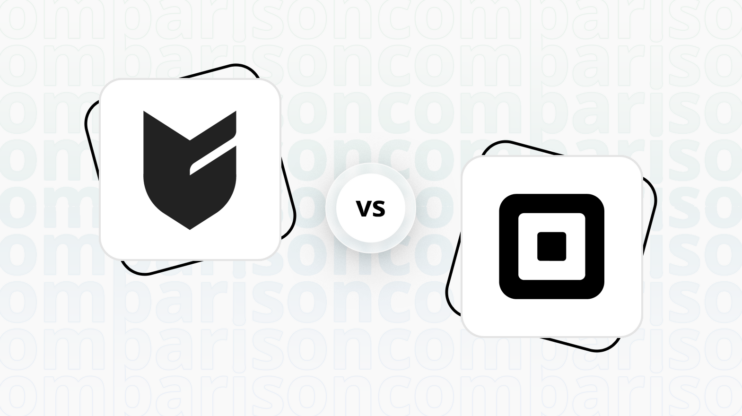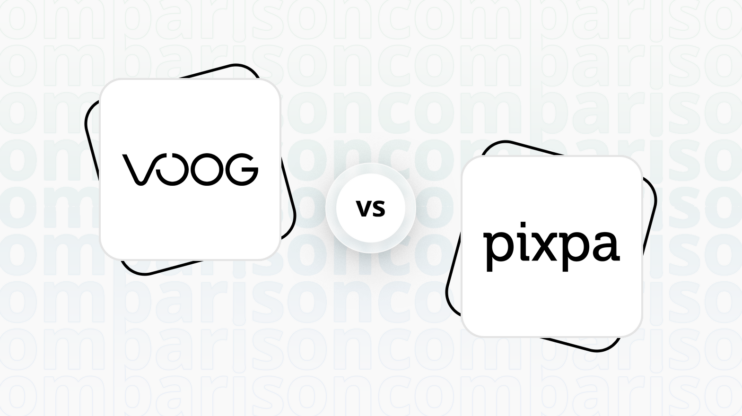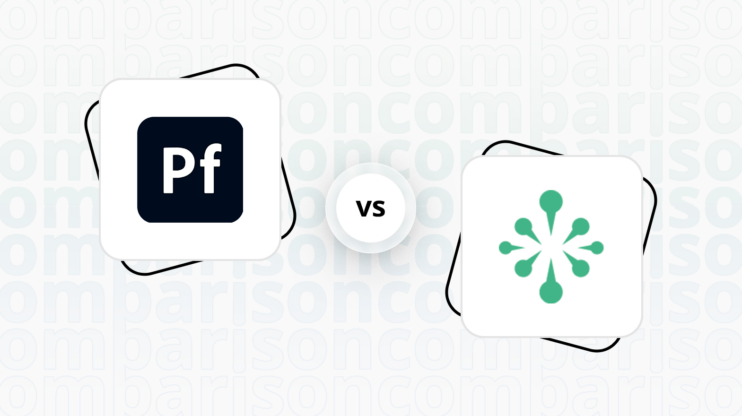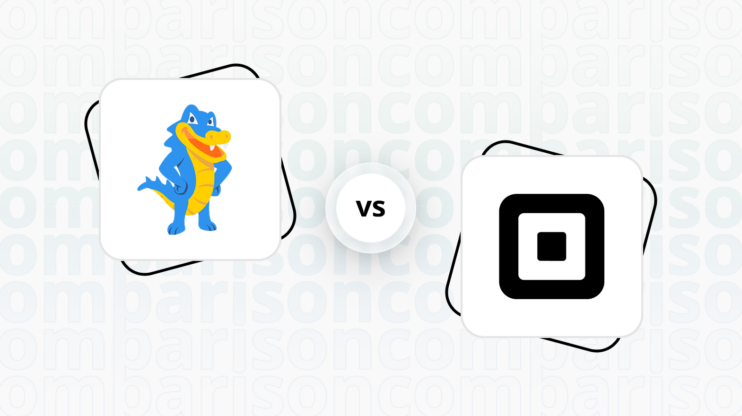Final verdict
GoDaddy and Jimdo both offer valuable website building solutions, but they cater to different user needs and preferences.
-
GoDaddy (Overall Grade: 7.5/10)
is a comprehensive platform that excels in providing a wide range of services, including domain registration, web hosting, and a user-friendly website builder. It offers extensive design functionalities and templates, making it ideal for users seeking creative control and versatility. GoDaddy’s ecommerce capabilities are robust, with integrated payment processing and flexible shipping options, making it a strong choice for small to medium-sized businesses looking to grow their online presence. -
Jimdo (Overall Grade: 7.2/10)
is a user-friendly website builder designed for individuals and small businesses with basic computer skills or limited time. It stands out for its simplicity and ease of use, offering a range of templates and an intuitive interface. Jimdo’s ecommerce features are suitable for smaller stores, and its AI-driven website builder, Jimdo Dolphin, provides a quick and easy way to create websites based on user responses. While it may not offer the same level of advanced features as GoDaddy, Jimdo is a great option for those looking for a straightforward and efficient website building experience.

|

|
|
|---|---|---|
|
Design functionalities & templates |
8.0 |
7.2 |
|
Ease of use |
8.2 |
8.0 |
|
Ecommerce |
7.2 |
7.0 |
|
Website Editors |
6.7 |
7.8 |
|
Product testing options |
8.1 |
6.4 |
|
Price |
7.9 |
7.5 |
|
Hosting quality |
7.8 |
6.7 |
|
Website speed optimization |
7.6 |
7.6 |
|
Plugins/extensions and integrations |
7.3 |
7.4 |
|
Marketing features |
7.3 |
7.2 |
|
Customer support |
8.5 |
6.8 |
|
Website security |
6.8 |
8.3 |
|
AI capabilities |
7.5 |
6.0 |
|
User Management |
7.3 |
5.8 |
Best for ecommerce
 7.2
7.2
 7.0
7.0
Verdict
: GoDaddy offers a more comprehensive suite of ecommerce tools, making it suitable for small to medium-sized businesses looking for robust features. Jimdo, while simpler, is ideal for users with basic computer skills or limited time.
-
GoDaddy
: Known for its extensive ecommerce capabilities, GoDaddy provides integrated payment processing, flexible shipping options, and comprehensive tools for product and order management. It also offers around 70-80 ecommerce themes, SEO tools, email marketing features, and detailed reports. However, advanced customization may require coding knowledge. When comparing GoDaddy vs Jimdo, GoDaddy stands out for its more robust and versatile ecommerce features. -
Jimdo
: Jimdo excels in simplicity and ease of use, making it a great choice for those with basic computer skills or limited time. It offers product details and variations, inventory tracking, no transaction fees, discount codes, and email marketing. Jimdo’s drag-and-drop interface allows for easy customization, and it supports various payment gateways like PayPal and Stripe. However, it may lack the advanced features and scalability offered by GoDaddy.
Best for informational & business websites
 7.9
7.9
 7.4
7.4
Verdict
: GoDaddy is the better choice for informational business websites, offering a more extensive range of templates and a user-friendly interface, while Jimdo provides simplicity and ease of use but with fewer design options.
-
GoDaddy
: GoDaddy excels in providing a comprehensive platform with a wide array of templates and design features, making it ideal for creating visually appealing informational websites. Its user-friendly interface and extensive learning resources make it easy for beginners to get started. With a score of 7.9, GoDaddy is well-suited for businesses looking for versatility and robust support. -
Jimdo
: Jimdo is a solid choice for users seeking simplicity and ease of use. It offers a straightforward website building experience with its AI-driven Dolphin mode and customizable Creator mode. However, it falls slightly behind GoDaddy in terms of design flexibility and template variety. With a score of 7.4, Jimdo is best for those who prioritize ease of use over extensive design options.
Detailed comparison
Design functionalities & templates
Design FunctionalitiesRepresents how well each platform allows for creative design and customization of websites.Score Components:
- Template Variety (30%): Range and quality of design templates.
- Customization (30%): Flexibility and options for design alterations.
- User Interface (20%): Ease and intuitiveness of the design process.
- Responsiveness (10%): Adaptability to different devices and screen sizes.
- Innovation (10%): Unique design features and tools.
 8.0
8.0
 7.2
7.2
🏆
Winner: GoDaddy.
If you’re looking for a platform that offers more creative control, a wide array of design features, and an extensive collection of templates, GoDaddy is the preferred choice.
GoDaddy provides an extensive collection of over 1500 website templates catering to diverse industries and design preferences. These templates cover business, ecommerce, creative, personal, and non-profit sectors, offering various styles such as modern, classic, bold, minimalist, and content-focused. With customization options, mobile responsiveness, and a combination of free and premium templates, GoDaddy aims to meet the needs of users seeking versatile and visually appealing website designs.
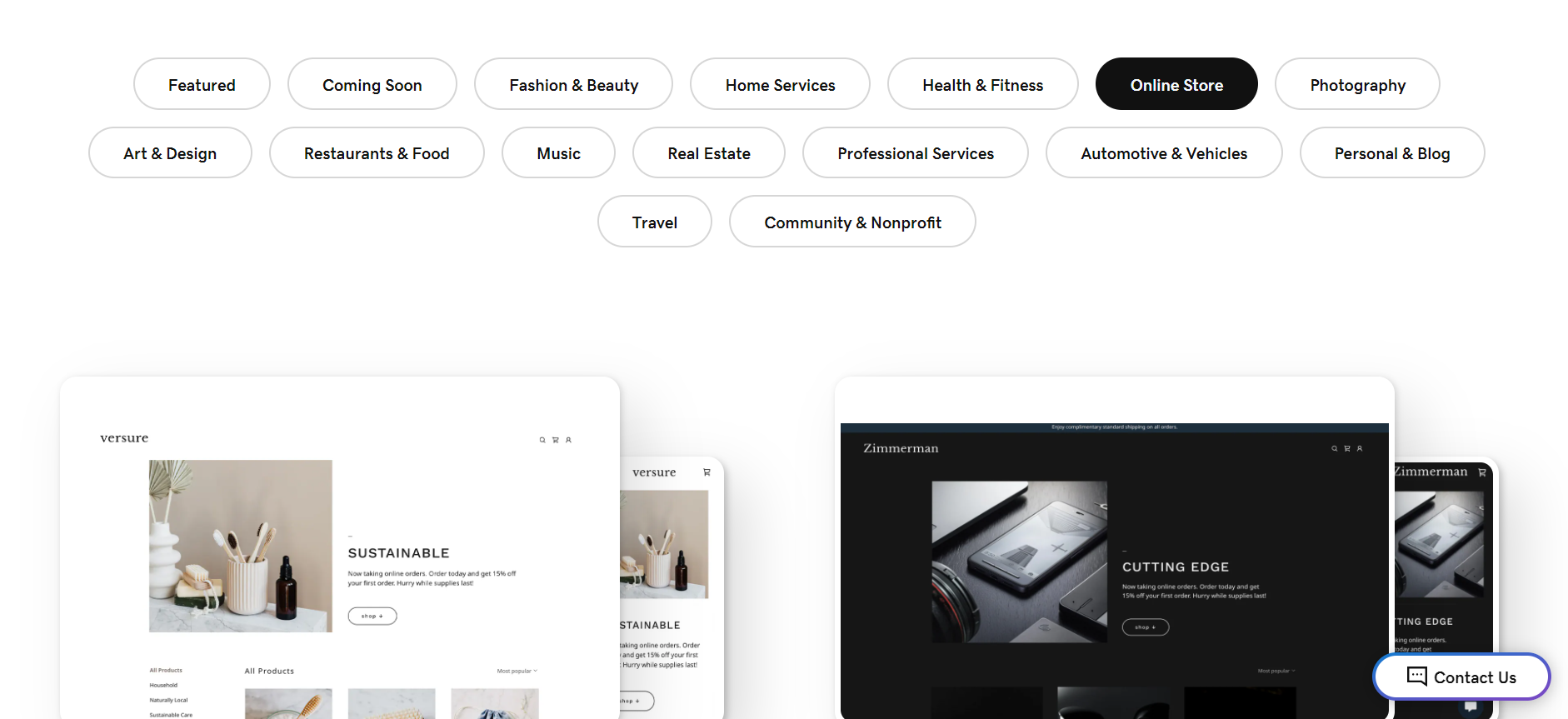

Compared to GoDaddy, Jimdo offers a diverse range of templates suitable for various industries and user preferences, with options to preview and select templates easily. The platform allows flexibility in changing templates for existing websites and also provides a “Blank Template” for custom designs, catering to both beginners and advanced users.


Get a head start on website creation with AI
Create a custom website tailored to your business needs 10X faster with 10Web AI Website Builder!
Ease of use
Ease of useReflects the platform’s overall user-friendliness.Score
Components:
- Learning curve (40%): Quickness and ease of getting started.
- Interface design (30%): Simplicity and intuitiveness of layout.
- User guidance (20%): Quality of tutorials and support.
- Flexibility (10%): Adaptability to various user skills.
 8.2
8.2
 8.0
8.0
🏆 Winner: GoDaddy
. Scoring a solid 8.2, GoDaddy stands out for its user-friendly interface, making it exceptionally easy for beginners to create and manage their websites. Jimdo, with a score of 8.0, offers a robust platform but with a slightly steeper learning curve, especially for those new to website building. If ease of use is a priority, GoDaddy is the clear winner in this category.
Learning Resources
🏆 Winner: GoDaddy
. While both platforms offer solid learning resources, GoDaddy goes a step further with its wide array of detailed tutorials and active community forums, making it easier for users to learn and adapt.
For ecommerce
EcommerceMeasures the platform’s effectiveness in supporting online business activities.Score Components:
- Ecommerce themes and templates (20%): Variety and design of templates.
- Product management (25%): Ease of managing and organizing products.
- Payment options (25%): Variety and convenience of payment methods.
- Ecommerce features (20%): Features for managing an ecommerce store.
- Integration (10%): Compatibility with external e-commerce tools and services.
 7.2
7.2
 7.0
7.0
GoDaddy and Jimdo both offer a range of ecommerce features suitable for small to medium-sized businesses. GoDaddy’s ecommerce capabilities are more comprehensive, with integrated payment processing, flexible shipping options, and comprehensive tools for product and order management. Jimdo, on the other hand, offers a simpler and more intuitive interface, making it a good choice for those with basic computer skills or limited time.

|

|
|
|---|---|---|
|
Ecommerce themes and templates |
6.5 |
6.5 |
|
Product page customization |
6.0 |
6.8 |
|
Payment processing and commissions |
7.5 |
7.5 |
|
POS capabilities |
6.0 |
5.0 |
|
Payment gateways |
7.0 |
7.0 |
|
Product numbers |
7.0 |
6.0 |
|
Additional ecommerce features |
6.5 |
6.5 |
GoDaddy ecommerce features:
- Payment processing
- Shipping options
- SEO tools
- Email marketing features
- Social media integrations
- Detailed reports
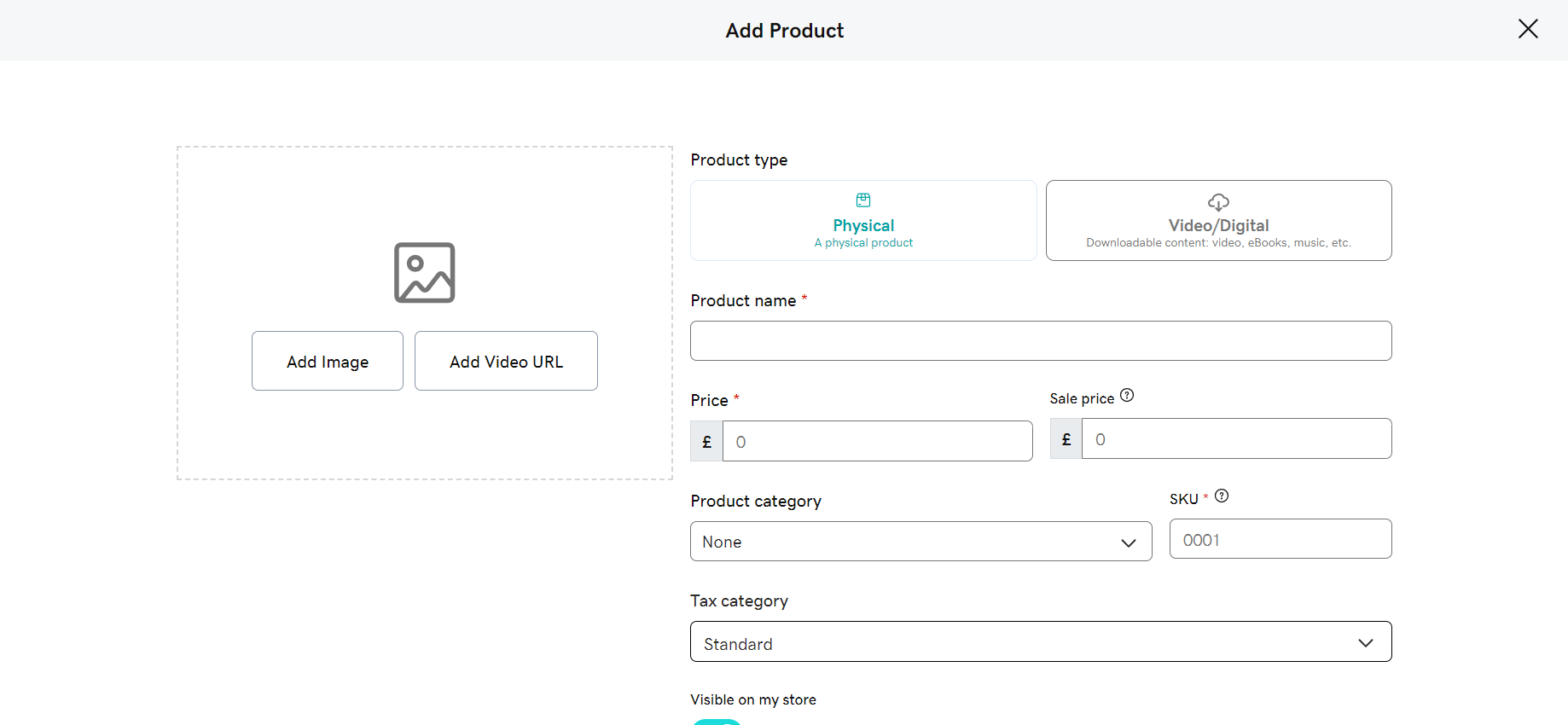
Jimdo ecommerce features:
- Product details and variations
- Inventory tracking
- No transaction fees
- Discount codes and promotions
- Email marketing
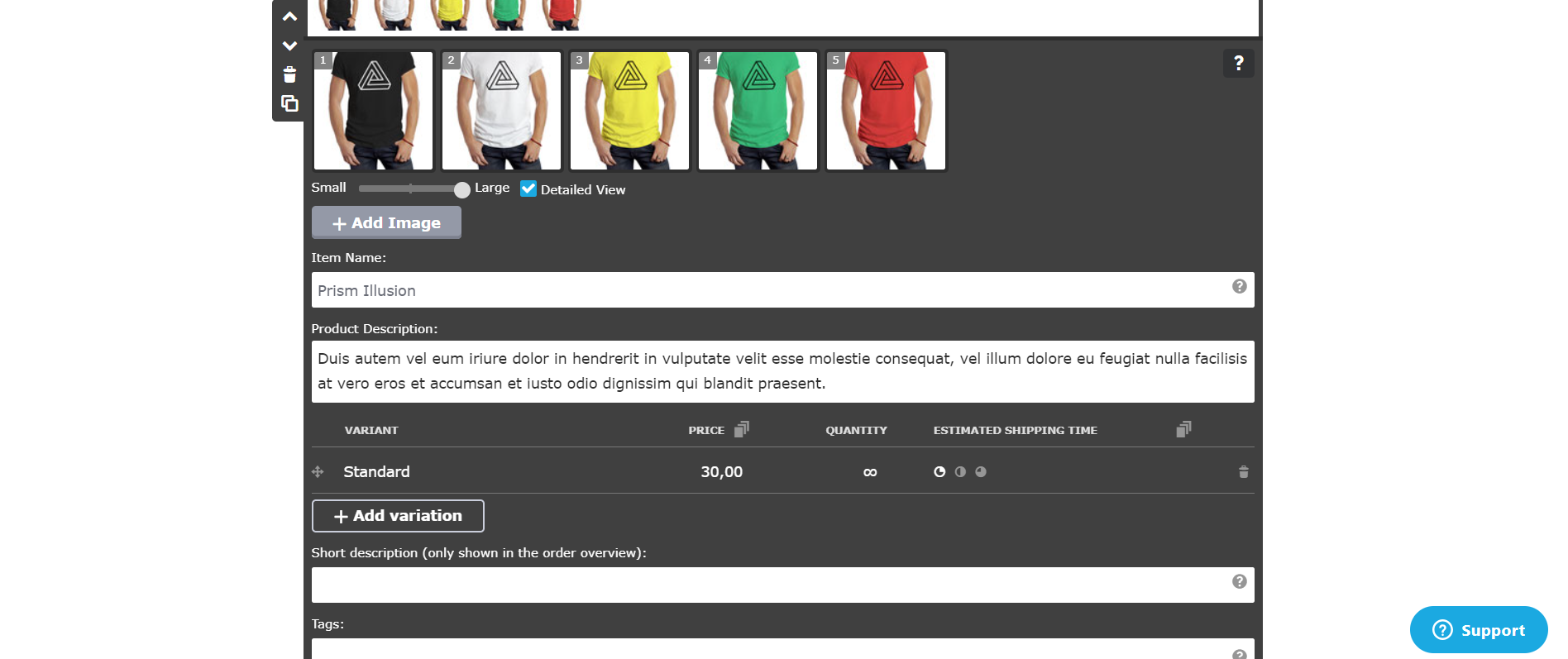
Ecommerce themes & templates
GoDaddy offers around 70-80 ecommerce themes that cover diverse industries and styles. However, these themes may lack the niche variety and cutting-edge designs found on dedicated ecommerce platforms. On the other hand, Jimdo offers a diverse range of pre-designed themes that ensure a mobile-friendly and smooth shopping experience. The drag-and-drop interface allows for easy customization of colors, fonts, and layouts.
Product page customization
GoDaddy offers basic customization options like editing content, adding images, and adjusting layouts. For advanced customization, coding knowledge is required. Jimdo, on the other hand, offers a user-friendly interface for personalizing various elements on the product page. It also offers additional features such as SEO tools and mobile responsiveness.
Payment processing
GoDaddy Payments provides a versatile solution for online, in-person, and phone payments with a tiered pricing structure. However, it may lack advanced Point of Sale (POS) features. Jimdo facilitates payment processing through various popular gateways like PayPal, Stripe, Mollie, and more, depending on your location and plan. While Jimdo doesn’t impose transaction fees, individual payment gateways may have their own charges.
Considering the features, availability, cost, and flexibility, both GoDaddy and Jimdo offer decent ecommerce capabilities. However, GoDaddy seems to be a more comprehensive solution, while Jimdo offers simplicity and ease of use.
Website Editors
Website EditorsEvaluates the platforms’ website building and editing capabilities.Score Components:
- Customization tools (40%): Range and power of editing features.
- Editor usability (30%): User experience within the editor.
- Design flexibility (20%): Freedom in layout and design changes.
- Update and maintenance ease (10%): Simplicity of updating and maintaining the site.
 6.7
6.7
 7.8
7.8
🏆
Winner: Jimdo
. With a score of 7.8, Jimdo offers two main modes for its editor: Jimdo Dolphin and Jimdo Creator. The Dolphin mode is an AI-driven tool ideal for beginners, creating websites based on user responses to a series of questions. The Creator mode provides a more traditional website building experience with greater customization options, including a drag-and-drop editor and HTML widgets.
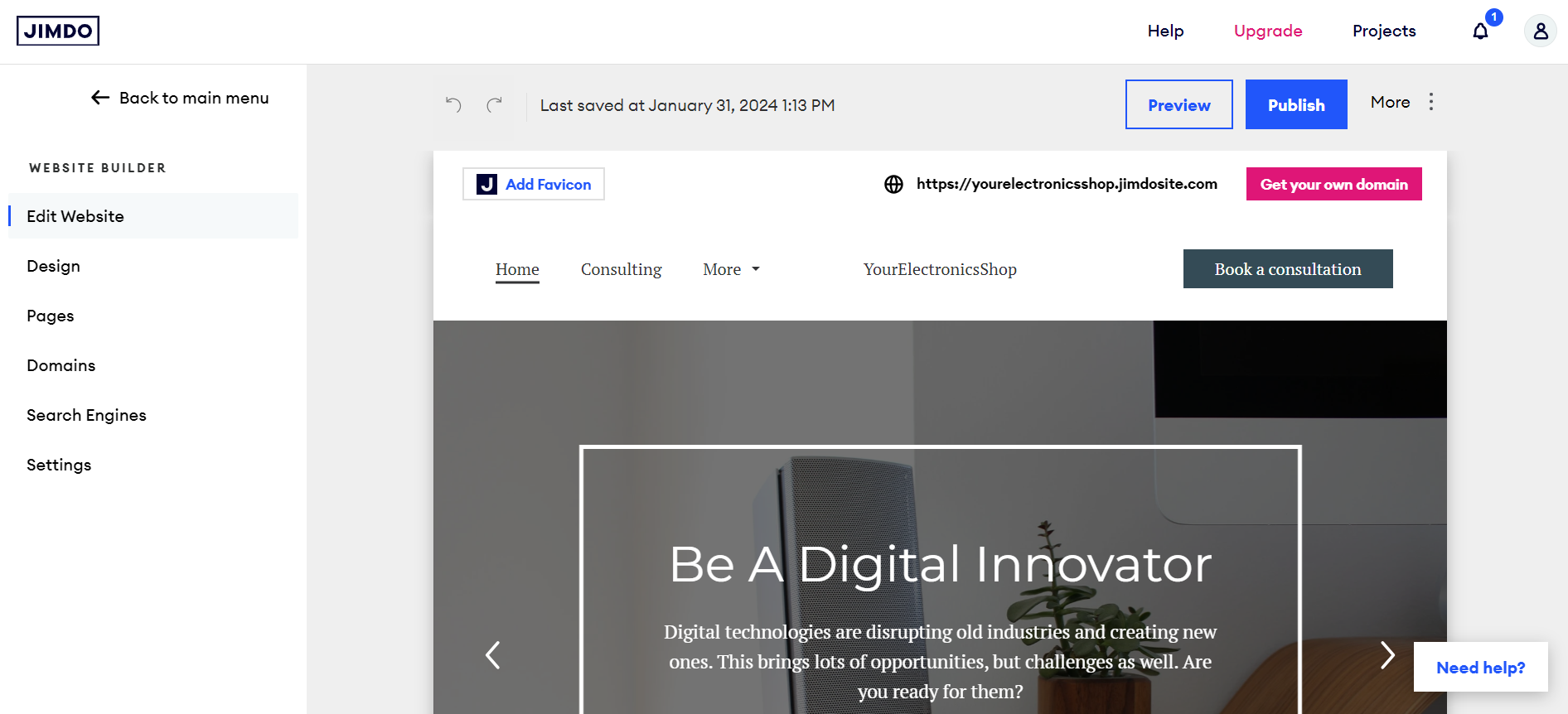
GoDaddy’s editor, scoring 6.7, is a user-friendly drag-and-drop tool enabling website creation without coding. It offers pre-designed templates, a mobile-friendly interface, basic SEO tools, and ecommerce integration. However, it has some design limitations and potentially limited third-party app integrations.
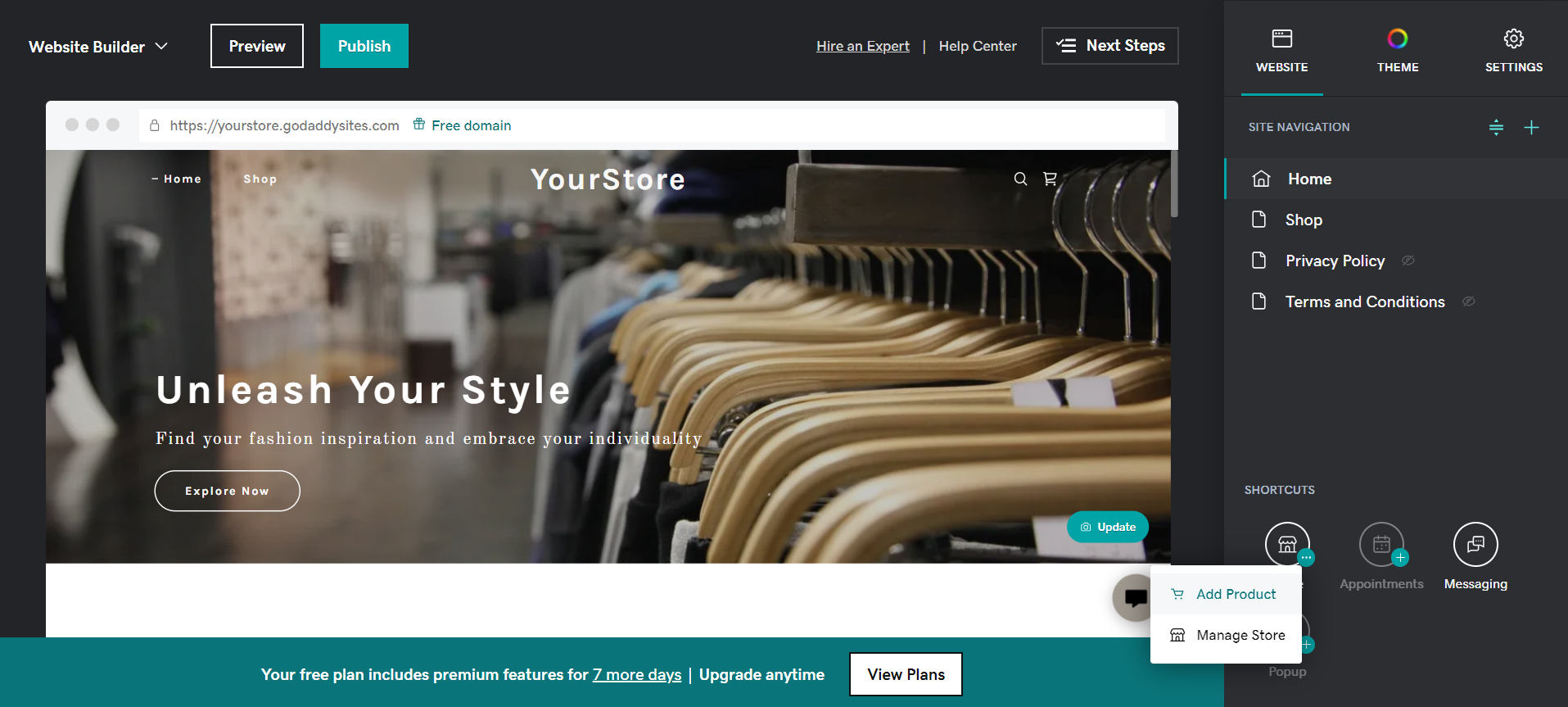
Mobile editor/app
 5.5
5.5
 8.0
8.0

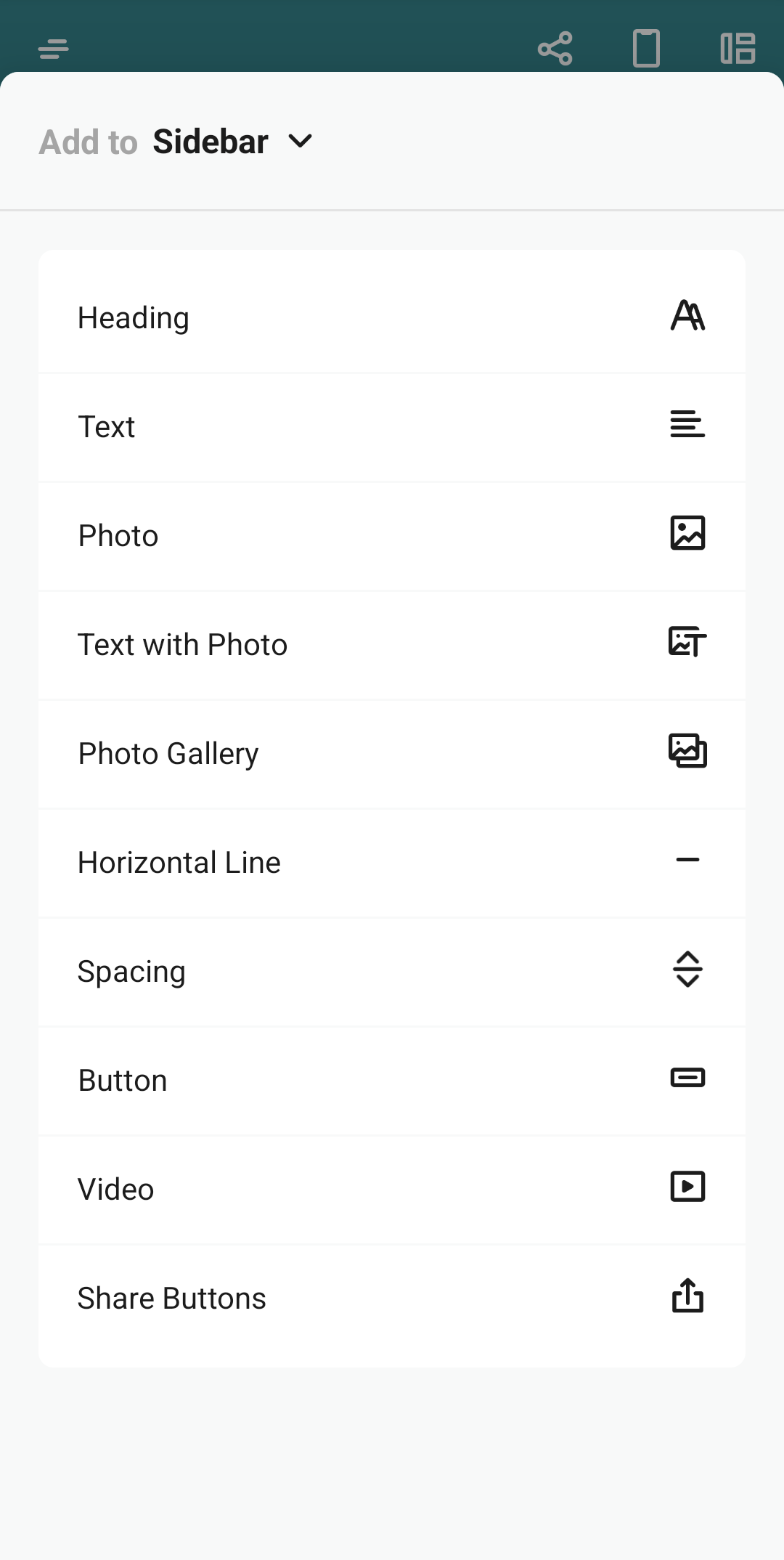
🏆
Winner: Jimdo
. Both GoDaddy and Jimdo offer mobile editing capabilities, but they differ in their approach. GoDaddy does not have a dedicated mobile app for editing websites built with their Website Builder. Instead, users must log into their GoDaddy account and access the website builder through a mobile web browser. This experience might be slightly more constrained on a smaller screen.
Jimdo, on the other hand, offers a dedicated mobile editor app, allowing users to create and manage their websites directly from their smartphones or tablets. This app provides a convenient way to edit and update your site on the go, including adding or modifying content, adjusting design elements, and managing your online store.
In summary, given the higher mobile editor score for Jimdo and its dedicated mobile app, Jimdo is the clear winner in this category.
Product testing options
Product Testing OptionsAssesses the options for trying out platform features before commitment.Score Components:
- Trial quality (40%): Extent and usefulness of the trial or free version.
- Feature accessibility (30%): How many features are available to test.
- Trial duration (20%): Length of the trial period.
- Ease of transition (10%): Smoothness of moving from trial to paid plans.
 8.1
8.1
 6.4
6.4
Overall Result
:
GoDaddy wins
. GoDaddy scores 8.1, while Jimdo scores 6.4 in product testing options. GoDaddy offers a free version and a 30-day money-back guarantee for all paid plans, allowing users to explore all features and make a decision within the refund window. Jimdo also offers a free version and a 14-day money-back guarantee for all paid plans, but the shorter refund period might limit the testing experience.

|

|
|
|---|---|---|
|
Free Plan |
Yes | Yes |
|
Trial Duration |
No (30-day money-back guarantee) |
No (14-day money-back guarantee) |
|
Testing Premium Features |
Yes |
Yes |
Price
PriceLooks at the cost-effectiveness and value for money of each platform.Score Components:
- Plan value (40%): What each pricing tier offers.
- Transparency and clarity (30%): Clearness of pricing structures.
- Flexibility of plans (20%): Range of options to suit different budgets.
- Hidden costs (10%): Additional expenses not included in the plan.
 7.9
7.9
 7.5
7.5
GoDaddy and Jimdo offer a range of plans to suit different needs, with GoDaddy offering more advanced ecommerce features in its higher-tier plans.

|

|
|
|---|---|---|
|
Free |
Free ($0/month): Build a basic website with limited templates, storage, and features. Ideal for testing the platform. |
Play ($0/month): Basic, entry-level plan offering limited features, ideal for testing Jimdo’s capabilities. Includes 500MB storage and up to 5 website pages. Limited ecommerce functionality. |
|
$0-$7 |
Basic ($5.99/month): More templates, custom domain support, email marketing, SEO tools, social media integrations, analytics. Ideal for personal websites and small businesses. Value for price: 6.5 |
No offering at this amount. |
|
$7-$10 |
Premium ($9.99/month): All Basic features + blog, ecommerce with product listings and payments, advanced marketing tools, and analytics. Ideal for businesses with online sales or growing web presence. Value for price: 8.0 |
Start ($9/month): Aimed at small projects or businesses just starting out. Provides 5GB of storage and up to 10 website pages, along with SEO tools for online visibility. Not directly focused on ecommerce. Value for price: 6.5 |
|
$10-$17 |
Commerce ($15.99/month): All Premium features + advanced ecommerce tools like cart recovery, discounts, reviews, memberships, and unlimited products. Ideal for businesses with significant online sales and complex product offerings. Value for price: 9.0 |
Grow ($15/month): Targets growing businesses needing more space and features. Offers more flexibility but still lacks dedicated ecommerce capabilities compared to the Business plan. Provides 20GB bandwidth with up to 50 website pages. Value for price: 7.5 |
|
$17-$20 |
Pro ($19.99/month): All Commerce features + priority support, higher bandwidth, website security, and CDN. Ideal for businesses with high traffic and critical online presence. Value for price: 9.5 |
Business ($19/month): Designed for small to medium-sized online stores, offering ecommerce features without transaction fees. Includes selling on Facebook and Instagram, and various payment options. And up to 50 website pages. Value for price: 8.5 |
|
$30+ |
No offering at this amount. |
VIP ($39/month): Provides comprehensive features for large or expanding online stores, including unlimited storage and priority support and unlimited website pages. Includes professional design review and no transaction fees. Value for Price: 9.5 |
location. As a result in rare cases the prices displayed here can differ from the ones you see on their
websites.
Hosting quality
Hosting
qualityExamines the reliability and performance of the hosting solutions.Score Components:
- Uptime (40%): Consistency and reliability of website availability.
- Speed (30%): Loading times and performance.
- Bandwidth and storage (20%): Sufficiency of resources provided.
- Data centers (10%): Quality and distribution of hosting infrastructure.
 7.8
7.8
 6.7
6.7
Winner: GoDaddy
. GoDaddy offers a range of hosting types, including shared, VPS, dedicated, and WordPress hosting. It guarantees 99.9% uptime and has data centers in the USA, France, Germany, and the UK. Jimdo, on the other hand, offers shared, cloud, and managed hosting with 99.5% uptime but does not provide an uptime guarantee. While Jimdo does not disclose the exact locations of its data centers, it uses a distributed network of secure and reliable facilities.

|

|
|
|---|---|---|
|
Do they offer hosting? |
Yes, included in all of their plans |
Yes, included in all of their plans |
|
Data Centers: |
Data Centers in USA, France, Germany and UK Cloud Services Through AWS |
While Jimdo doesn’t publicly disclose the exact locations of its data centers, they utilize a distributed network of highly secure and reliable facilities spread across multiple regions |
|
Type of hosting: |
Shared Hosting, VPS Hosting, Dedicated, WordPress Hosting |
Shared Hosting, Cloud Hosting, Managed Hosting |
|
Uptime: |
99.9% |
99.5% |
|
Uptime Guarantee: |
Yes, 99.9% |
No |
Website Speed Optimization
Website Speed OptimizationEvaluates optimization of website loading timesScore Components:
- PageSpeed Score (30%): Google’s score indicating performance optimization.
- Loading Time (30%): The average time until a website is fully interactive.
- Mobile Optimization (15%): Optimization effectiveness for mobile devices.
- Resource Optimization (15%): Optimizing images, scripts, and other heavy resources.
- CDN Usage (10%): Use of CDN to enhance speed across geolocations.
 7.6
7.6
 7.6
7.6
🏆 Winner: Tie
Both GoDaddy and Jimdo have the same score when it comes to website speed optimization. They both have implemented various strategies to optimize the speed of the websites built on their platforms.

|

|
|
|---|---|---|
|
Focus |
CDN, Automatic Maintenance, Resource Optimization |
Content Optimization, CDN, Image optimization, Caching, Mobile Responsive design |
|
Performance Tools |
Improved server infrastructure, data centers, caching mechanisms, image optimization tools, automatic minification of code files |
Optimizing LCP, Enhancing FID, Improving CLS |
|
Load Times |
Shared Hosting: 2-4 seconds, VPS Hosting: 1-2 seconds, Dedicated Server: 0.5-1.5 seconds |
Varies widely, dependent on optimization |
|
Page Speed Scores Range |
Shared Hosting: 50-70/100, VPS Hosting: 70-85/100, Dedicated Server: 80-95/100 |
Scores vary; influenced by plugins, images |
|
Core Web Vitals Improvement |
Infrastructure upgrades, improved server infrastructure and data centers, effective caching mechanisms, image optimization tools, and automatic minification of code files |
Optimizing LCP, Enhancing FID, Improving CLS |
GoDaddy has enhanced its platform through infrastructure upgrades, including improved server infrastructure and data centers, resulting in faster loading times. Additionally, the implementation of effective caching mechanisms, image optimization tools, and automatic minification of code files contribute to a smoother user experience and improved Core Web Vital metrics. The website builder features optimized templates and code structures for efficient rendering, further enhancing overall performance.
Jimdo, on the other hand, focuses on optimizing the Largest Contentful Paint (LCP), enhancing First Input Delay (FID), and improving Cumulative Layout Shift (CLS). These strategies, along with content optimization, use of CDN, image optimization, caching, and mobile responsive design, help in improving the speed of the websites built on Jimdo. However, the load times and PageSpeed scores can vary widely, depending on the optimization.
Get a head start on website creation with AI
Create a custom website tailored to your business needs 10X faster with 10Web AI Website Builder!
Plugins and integrations
Plugins and integrationsMeasures the range and effectiveness of additional plugins and integrations.Score Components:
- Variety of options (40%): Range of available add-ons.
- Integration smoothness (30%): Ease of integrating plugins into the site.
- Quality of plugins (20%): Functionality and reliability of the options.
- Custom integration capabilities (10%): Support for custom or third-party integrations.
 7.3
7.3
 7.4
7.4
🏆 Winner: Jimdo.
With a score of 7.4, Jimdo slightly edges out GoDaddy, which scores 7.3. Jimdo offers a range of plugins and extensions, with POWr and Elfsight being major providers. These tools enhance website functionality and cater to diverse business and marketing needs. On the other hand, GoDaddy’s Website Builder offers a limited set of built-in features, with certain premium apps available for additional fees, and lacks a traditional plugin marketplace like WordPress. However, on GoDaddy Managed WordPress Hosting, users have access to the extensive WordPress plugin repository.
Marketing Features
Design FunctionalitiesRepresents how well each platform allows for creative design and customization of websites.Score Components:
- Template Variety (30%): Range and quality of design templates.
- Customization (30%): Flexibility and options for design alterations.
- User Interface (20%): Ease and intuitiveness of the design process.
- Responsiveness (10%): Adaptability to different devices and screen sizes.
- Innovation (10%): Unique design features and tools.
 7.3
7.3
 7.2
7.2
🏆
Overall Winner: GoDaddy
. GoDaddy edges out Jimdo with a slightly higher score, offering a comprehensive suite of marketing tools including SEO, email marketing, blogging, social media integration, analytics and reporting, and ads and promotions.

|

|
|
|---|---|---|
|
SEO Tools |
|
|
|
Email Marketing |
|
|
|
Blogging |
|
|
|
Social Media Integration |
Tools for social media linking and content sharing |
Integration features for various social media platforms |
|
Analytics and Reporting |
Basic analytics with more detailed insights on higher plans |
Integrated analytics for monitoring website traffic |
|
Ads and Promotions |
Features to create and track online ads, including Google Ads |
Tools and features for promotions |
Customer Support
Customer supportEvaluates the quality and availability of support options.Score Components:
- Response time (40%): Speed of support responses.
- Support quality (30%): Effectiveness and helpfulness of the support.
- Availability (20%): Range of support channels (phone, chat, email).
- Resource richness (10%): Quality of self-help and educational materials.
 8.5
8.5
 6.8
6.8
🏆 Winner: GoDaddy
. Comparing GoDaddy vs Jimdo, GoDaddy takes the lead with its extensive customer support options, including 24/7 phone support in multiple languages, live chat, and email assistance. The platform also offers a 24/7 Community Forum and social media support, ensuring users have access to help whenever they need it. Enterprise customers benefit from dedicated account managers and priority routing for quicker issue resolution.
Jimdo, on the other hand, provides email support, a call center, and a comprehensive knowledge base. While it lacks live chat support, Jimdo offers social media support and specific request forms for certain issues. However, its support options may vary based on the user’s plan, and it does not currently offer an enterprise plan, making it less suitable for larger organizations.
Security
SecurityLooks at the platforms’ security measures and data protection.Score Components:
- Data protection (40%): Safeguards for user and customer data.
- SSL and encryption (30%): Implementation of secure connections.
- Compliance (20%): Adherence to industry security standards.
- Regular updates (10%): Frequency of security updates and patches.
 6.8
6.8
 8.3
8.3
🏆
Winner: Jimdo
. Jimdo takes the lead in security with a higher security score and a comprehensive approach to data protection and website security. Jimdo’s commitment to GDPR compliance, use of AI for personalization without data training, and anonymization of web analytics data demonstrate a strong focus on data privacy. In terms of website security, Jimdo employs a strong firewall, DDoS protection, and encryption for all traffic and messages, ensuring a safe environment for users and their websites.
GoDaddy, while offering robust website security features like SSL certificates, malware scanning, and web application firewalls, falls short in terms of private data storage protection. Its limitations, especially in compliance with regulations like HIPAA or GDPR, make it less appealing for users seeking comprehensive data security.
AI Capabilities
AI capabilitiesMeasures the effectiveness of AI-driven features and tools.Score Components:
- Automation efficiency (40%): Impact of AI on streamlining processes.
- Personalization (30%): AI-driven customization for users or customers.
- AI-Assisted design (20%): Role of AI in website design and functionality.
- Data analysis (10%): Use of AI in interpreting user data and analytics.
 7.5
7.5
 6.0
6.0

|

|
|
|---|---|---|
|
AI Website Builder |
|
Jimdo offers an AI-driven website builder |
|
AI Ecommerce Features |
AI-generated product descriptions and customer service tools |
Basic AI-powered design suggestions for store layouts |
|
AI Content Generation |
AI-generated product descriptions and social media ads |
|
🏆 Winner: GoDaddy
. Despite not having an AI website builder, GoDaddy’s AI capabilities are more comprehensive, particularly in the eCommerce and content generation aspects. GoDaddy’s AI tools are designed to save time and improve work-life balance for small business owners.
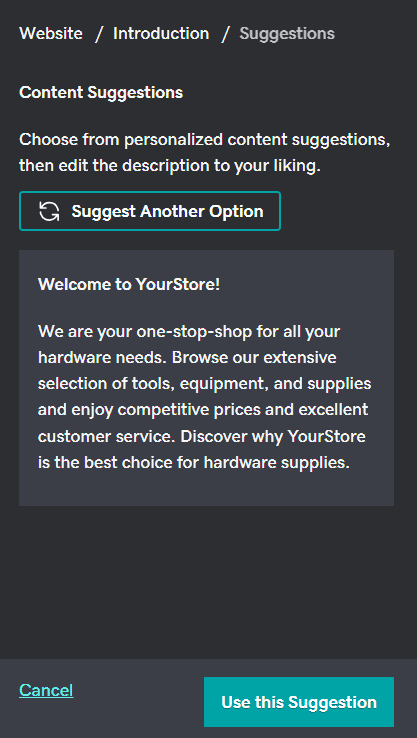
Jimdo, with a score of 6.0, offers an AI website builder, but its AI capabilities are basic and mostly focused on website creation. It lacks a direct, dedicated content generation feature, which is a significant disadvantage compared to GoDaddy.

User Management
User ManagementAssesses the platforms’ capabilities in managing user roles, permissions, and accessibility.Score Components:
- Role Customization (40%): Flexibility in creating and defining user roles and
permissions. - Ease of Management (30%): User interface and tools for managing users.
- Access Control (20%): Effectiveness of access control measures for different user
levels. - Scalability (10%): Ability to manage a growing number of users efficiently.
 7.3
7.3
 5.8
5.8
🏆 Winner: GoDaddy
. Both GoDaddy and Jimdo offer different user management capabilities depending on the plan.
- GoDaddy’s Website Builder (GoCentral and Websites + Marketing) allows up to five users with full editing permissions on Deluxe and Ultimate plans. In WordPress Hosting, there’s default support for unlimited users, each with customizable permission levels controlled through the WordPress dashboard.
- Jimdo’s Free, Start, and Basic Shop Plans allow website management by a single owner. The Grow Shop Plan permits two editors, including the account owner and one collaborator. The Business Plan extends collaboration to five editors, consisting of the account owner and four collaborators. The Unlimited Plan provides unlimited editors, fostering a collaborative team environment.
GoDaddy User Roles and Access Levels:
| Role | Description | Access Highlights |
|---|---|---|
| Account Holder | The primary owner of the GoDaddy Website Builder account. | Full access to all website builder features, domain management, hosting settings, and account settings. |
| Delegate Access | Users granted permission by the account holder to access specific parts of the GoDaddy account. | Can be given varying levels of access, from managing domains and products to making purchases on behalf of the account holder. |
| Website Editor | Users with permissions to edit and update the website through the Website Builder interface. | Can customize the website, add or edit sections (e.g., image galleries, menus), and update content. |
| Online Store Manager | Specifically for websites with e-commerce capabilities, managing product listings, orders, and payments. | Access to manage the online store, including product listings, coupons, shopping cart, shipping, and payments. |
Jimdo does not provide information about user roles and access levels.
Additional Features

|

|
|
|---|---|---|
|
SSL Certificate |
|
|
|
Custom Domain |
|
|
|
Free Custom Domain Included |
|
|
|
International Domains |
|
|
|
Mobile Responsive |
|
|
|
Page Speed |
|
|
|
Website Builder Mobile App |
|
|
|
Convert a Website To An App |
|
|
|
Website Analytics |
|
|
|
Multilingual Sites |
|
|
|
Multiple Users |
|
|
User Feedback
Users generally praise GoDaddy for its affordability, reliability, and user-friendly interface, particularly in domain registration and hosting services. However, concerns include occasional interface changes, perceived slowness in website hosting, and dissatisfaction with pricing increases.
Jimdo, a website builder platform, receives mixed reviews from users. Positive feedback highlights its ease of use, no-code editor, and quick website development for basic sites. However, criticisms include outdated design, limited templates, and concerns about pricing transparency. Some users appreciate it for simple projects, while others find it lacking for more complex websites. Common issues include restricted SEO in the free tier, support limitations, and late responses. The overall impression suggests Jimdo may suit beginners but could be less ideal for those seeking advanced features or modern designs.
The making of this blog
We followed a clear, step-by-step process to write and research this article.
FAQ
Which platform is better for beginners, GoDaddy or Jimdo?
Can I use both GoDaddy and Jimdo for ecommerce?
How do GoDaddy and Jimdo compare in terms of design flexibility?
Which platform offers better customer support, GoDaddy or Jimdo?
Are GoDaddy and Jimdo equally good in terms of website speed optimization?
Which platform is more secure, GoDaddy or Jimdo?
Do GoDaddy and Jimdo offer AI capabilities?
How do user feedback and satisfaction compare between GoDaddy and Jimdo?










